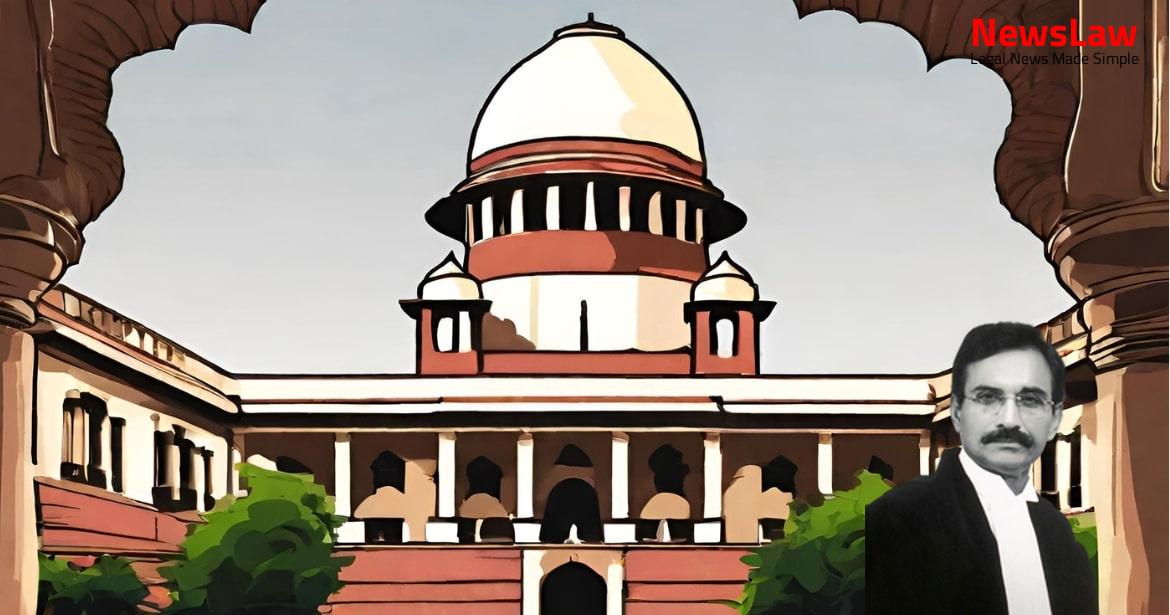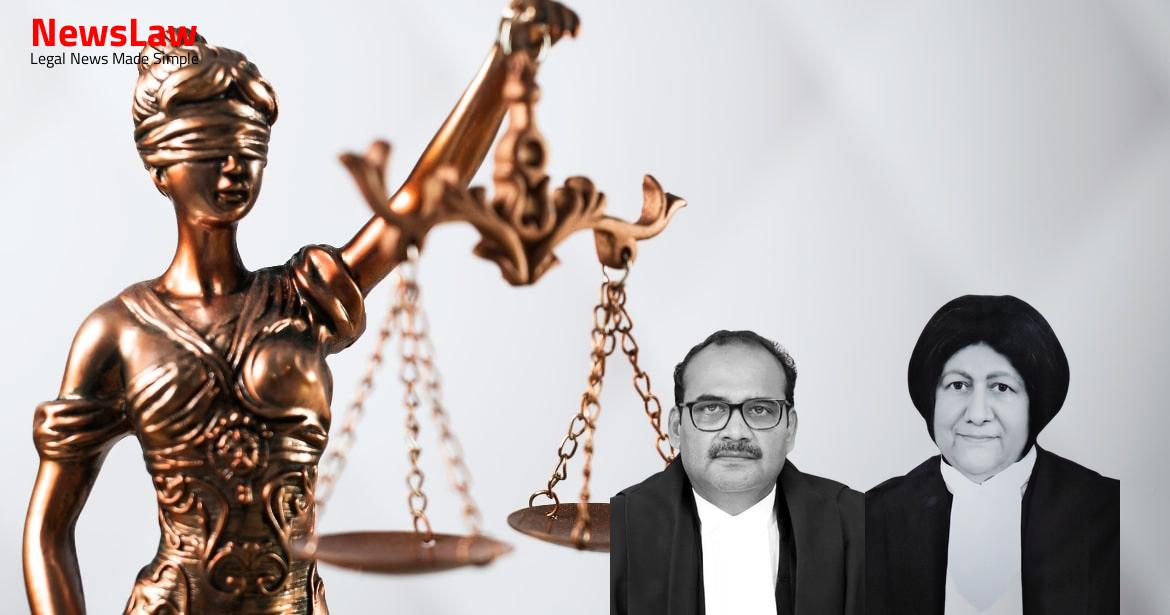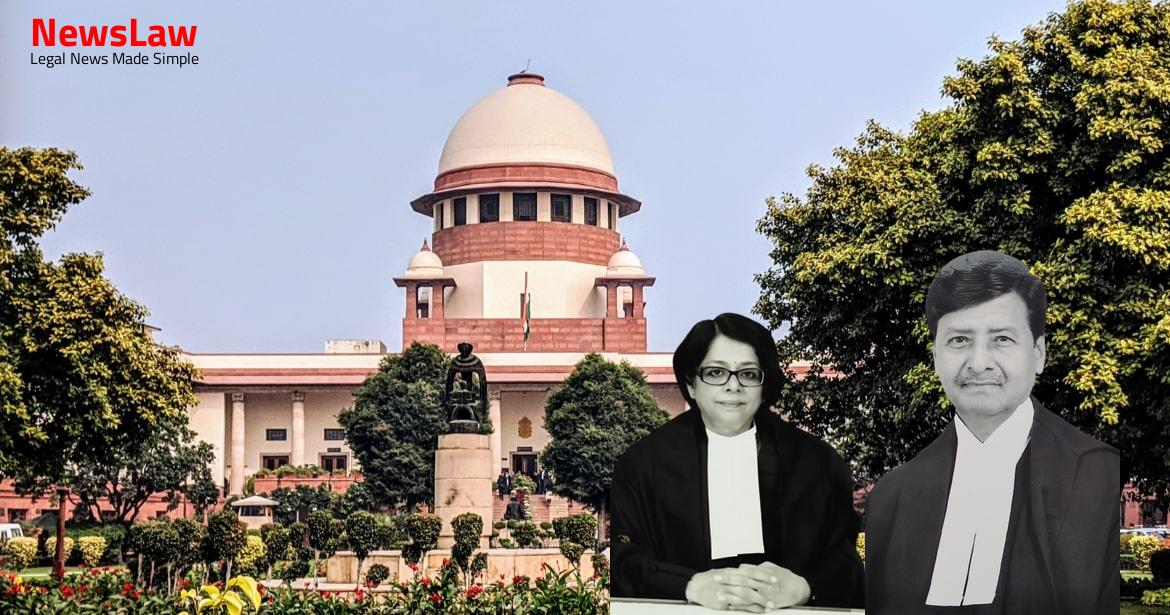Explore the intricate legal analysis conducted by the High Court regarding tenancy laws in a recent case. The judgment delves into the interpretation of key sections under the law, shedding light on the nuances of tenant-landlord relationships and the entitlements under the Act. Stay informed about the evolving legal landscape in the realm of property disputes and tenants’ rights.
Facts
- The appellant reiterated its demand for vacation of the property through subsequent notices.
- Attempts were made to settle the matter, with respondent No.1-BPCL showing interest in outright purchasing the property.
- The appellant filed an appeal against the denial of their prayer for the respondents to vacate the property.
- The property in question was leased to respondent No.1-BPCL in 1960, and the lease was renewed multiple times.
- The appellant approached the Madras High Court to direct the respondents to vacate the premises, which was not successful.
- Respondent No.1-BPCL operated a petrol bunk on the leased premises.
- There was a dispute regarding the maintainability of the writ petition due to involving disputed questions of fact.
- The lease with respondent No.1-BPCL ended on December 31, 2009, and the appellant issued a notice to terminate the lease on August 14, 2008.
- The matter was initially presented to a single judge at the Madras High Court.
- Division Bench held that relief claimed by the appellant for direction to vacate the premises cannot be granted in a petition under Article 226 of the Constitution of India.
- Appellant was directed to seek alternate remedy available in law.
- Conflict of judgment exist in the Madras High Court on the maintainability of the writ petition.
- References to past judgments highlighting conflicting views on the maintainability of writ petitions.
- Single judge mentioned the conflicting judgments in the Madras High Court reports.
- Single judge referred to specific cases where writ petitions were held maintainable and not maintainable.
Also Read: Presumption of Genuine Endorsements in Cheque Case
Arguments
- Shri V. Giri, Senior Counsel for the appellant argues that the issue is settled and not new.
- The Division Bench acknowledged similarity of the claims but could not provide relief due to the Tenants Act protection.
- The correctness of the Division Bench’s view is under scrutiny.
- Shri V. Giri advocates for directing BPCL to pay market rent from 31 December, 2009, till possession is given.
- Shri Kailash Vasdev, Senior Counsel for BPCL, contends that the sub-letting of premises to respondent No.2 is disputed and should be resolved by the appropriate forum.
- He also disagrees with the judgment in the case of R. Chandramouleeswaran and argues that BPCL’s sub-letting means they are not in physical possession, denying them rights under the Tenants Act.
- Shri Kailash Vasdev asserts that no legal or factual disputes exist in this case, and the High Court should have granted the writ petition.
- He criticizes BPCL for not paying rent post expiry of the lease, deeming it unbecoming for a statutory corporation.
- The High Court has rightly relegated the appellant to the alternate remedy available in law.
- The Division Bench of the High Court did not give much importance to the objection raised by respondent No.1-BPCL regarding the maintainability of the writ petition on the ground of alternate remedy.
- The agreements between BPCL and its dealers indicate that the possession of the premises along with all control lies with BPCL.
Also Read: Medical Negligence and Compensation: A Landmark Decision
Analysis
- The Division Bench of the High Court is tasked with recording a finding on whether the appellant is entitled to certain benefits under specific sections of the Act.
- The Division Bench should decide the said question independently and promptly, ideally within six months of receiving a copy of the order.
- Physical possession of the land is crucial for additional benefits under Section 9(1)(a)(ii) of the Act.
- Benefit under Section 9(1)(a)(ii) is not applicable if the lessee has made constructions but is not in possession of the land subsequently.
- The appeal regarding the interpretation of ‘actual physical possession’ is under scrutiny before the Supreme Court.
- The judgement in R. Chandramouleeswaran is considered a binding precedent under Article 141 of the Constitution.
- Various cases related to possession and entitlements under the Tenants Act and similar enactments were discussed by the Division Bench.
- The court emphasized the importance of physical possession for claiming benefits under the law.
- Different judgments and observations of the Supreme Court and the High Court were referred to by the Division Bench to build its decision.
- The Division Bench’s decision was guided by previous rulings related to possession rights and legal remedies available to tenants and companies.
- The Division Bench referred to the conduct of respondent No.1-BPCL in continuing to occupy premises without paying rent.
- The agreement between respondent No.1-BPCL and respondent No.2 grants a remedy only through a civil court or commercial courts.
- Tenants entitled to compensation under Section 9 against whom eviction proceedings initiated have the right to apply for court order to direct landlord to sell land for convenient enjoyment.
- The literal rule of interpretation dictates that plain and clear meaning of a statute should not be twisted.
- Giving a strained interpretation to ‘actual physical possession’ in Section 2(4) is not justified.
- Appellant deemed not in actual physical possession would not be granted the benefits under the Act.
- Tenant needs to be in actual possession without subletting for benefits under the Act.
- High Court did not consider whether the appellant is covered by specific sections of the Act and entitled to benefits.
- The case was remanded back to the Division Bench for a finding on the appellant’s coverage under the Act.
- Previous judgements on the issue should not influence the current decision-making process.
- Appellant tenant not entitled to protection under Tenants Act as not in actual physical possession.
- High Court’s decision to relegate appellant to alternate remedy found unsustainable.
- Unbecoming conduct of respondent No.1-BPCL in occupying premises without paying rent from 31 December, 2009.
Also Read: Remand of Writ Petition for Restoration and Decision on Merits
Decision
- Respondent No.1-BPCL directed to vacate and handover peaceful and vacant possession to the appellant within three months.
- Arrears of market rent to be paid by respondent No.1-BPCL from December 31, 2009, until the date of handing over possession.
- Determination of market rent postponed for three weeks.
- Both parties to submit written submissions on market rent with supporting documents within two weeks.
- Costs of Rs.1,00,000 to be paid by respondent No.1-BPCL to the appellant.
- Appeal allowed as per the above terms.
Case Title: NATIONAL COMPANY Vs. THE TERRITORY MANAGER BHARAT PETROLEUM CORPORATION LTD (2021 INSC 714)
Case Number: C.A. No.-006726-006726 / 2021



